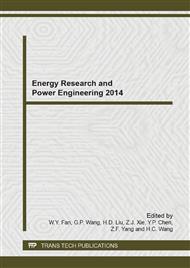[1]
Michael B. M, Xi L., Chris P. N., Yu X. W. Potential for Wind-Generated Electricity in China. Science, 2009, 325 (5946): 1378-1380.
Google Scholar
[2]
Jeremy Rifkin, Third Industrial Revolution (in Chinese), ZHANG T W, Sun Y L, translation. BeiJing, CITIC Press, 2012, 1st Edition.
Google Scholar
[3]
Lasseter R H, Micro-grids, IEEE Power Engineering Society Winter Meeting, 2002: 305-308.
Google Scholar
[4]
Ackermann T, Andersson G, Söder L. Distributed generation: a definition, Electric power systems research, 2001, 57(3): 195-204.
DOI: 10.1016/s0378-7796(01)00101-8
Google Scholar
[5]
Huang A Q, Crow M L, Heydt G T, et al. The future renewable electric energy delivery and management (FREEDM) system: the energy Internet, Proceedings of the IEEE, 2011, 99(1): 133-148.
DOI: 10.1109/jproc.2010.2081330
Google Scholar
[6]
Zha Y B, Zhang T, Tan S R, Huang Z, Wang W G, Understanding and Thinking of the Energy Internet (in Chinese)[J], National Defense Science and Technology, 2012, 33(5): 1-6.
Google Scholar
[7]
Ziang Zhang; Mo-Yuen Chow, Incremental cost consensus algorithm in a smart grid environment, Power and Energy Society General Meeting, 2011 IEEE , vol., no., p.1, 6, 24-29 July (2011).
DOI: 10.1109/pes.2011.6039422
Google Scholar
[8]
Ziang Zhang; Xichun Ying; Mo-Yuen Chow, Decentralizing the economic dispatch problem using a two-level incremental cost consensus algorithm in a smart grid environment, North American Power Symposium (NAPS), 2011 , vol., no., p.1, 7, 4-6 Aug. (2011).
DOI: 10.1109/naps.2011.6025103
Google Scholar
[9]
N. A. Lynch, Distributed Algorithms. San Francisco, CA: Morgan Kaufmann, (1997).
Google Scholar
[10]
Olfati-Saber, R.; Fax, J.A.; Murray, R.M., Consensus and Cooperation in Networked Multi-Agent Systems, Proceedings of the IEEE , vol. 95, no. 1, p.215, 233, Jan. (2007).
DOI: 10.1109/jproc.2006.887293
Google Scholar
[11]
A. Jadbabaie, J. Lin, and A. S. Morse, BCoordination of groups of mobile autonomous agents using nearest neighbor rules, [ IEEE Trans. Autom. Control, vol. 48, no. 6, p.988–1001, Jun. (2003).
DOI: 10.1109/tac.2003.812781
Google Scholar
[12]
Lavaei, J.; Murray, R.M., On quantized consensus by means of gossip algorithm - Part I: Convergence proof, " American Control Conference, 2009. ACC , 09. , vol., no., p.394, 401, 10-12 June (2009).
DOI: 10.1109/acc.2009.5160485
Google Scholar
[13]
Lavaei, J.; Murray, R.M., On quantized consensus by means of gossip algorithm - Part II: Convergence time, " American Control Conference, 2009. ACC , 09. , vol., no., p.2958, 2965, 10-12 June (2009).
DOI: 10.1109/acc.2009.5160568
Google Scholar


